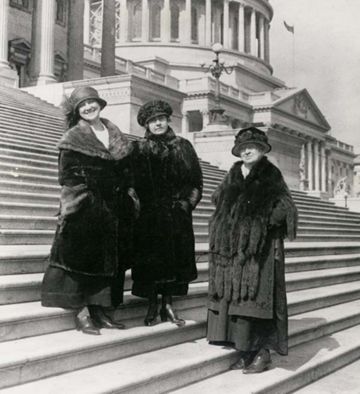From collection Candidates

In 1920, just months before ratification of the woman suffrage amendment, Alice Robertson, age 66, announced her candidacy for Oklahoma's Second Congressional District. Her platform stated simply: "I am a Christian. I am an American. I am a Republican." She won, in the first election after ratification, defeating the three-term incumbent William W. Hastings, and becoming the first woman elected to Congress from her state. Some people argued that she rode Warren Harding's coattails as her district was normally heavily Democratic. She served in the House of Representatives as a member of the Sixty-seventh Congress (March 4, 1921-March 3, 1923). She was an unsuccessful candidate for re-election in November 1922. Robertson pursued legislation that would help Indians, women, and farmers. She was outspoken and antagonized suffragists and other women's rights activists. Although a longtime supporter of servicemen, she voted against the Soldiers' Bonus Bill. On June 20, 1921 Robertson became the first woman to preside over a session of the House of Representatives (during a roll call vote on funding to send a U.S. delegation to centennial celebrations of Peru's independence.) Robertson was known for her service to soldiers and veterans, and her work with Native Americans. Her grandfather was missionary Samuel Worcester who lived in the Cherokee Nation and who brought a landmark case to the U.S. Supreme Court. See, Worcester v. Georgia, 31 U.S. 515 (1832) After graduation from Elmira College Alice Robertson worked as a clerk at the U.S. Bureau of Indian Affairs, 1873-79, taught at Indian schools and, in 1900 became supervisor of Creek Indian schools. In 1904 President T. Roosevelt appointed her Muskogee postmistress. She served until 1913. In 1916 Robertson had been the unsuccessful Republican candidate for County Superintendent of Schools
Related Items




